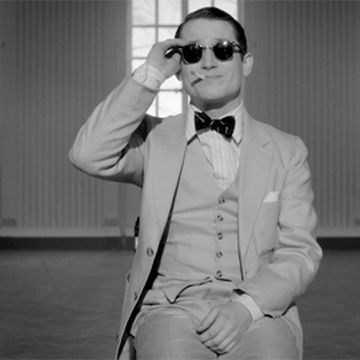
ÔÇ£How much trouble can one poet be?ÔÇØ weÔÇÖre asked early on in┬áSet Fire to the Stars, an account of a visit to the U.S. made by the Welsh poet Dylan Thomas in 1950. We then get a typical, ironic smash cut to Thomas himself (played by the disarmingly magnetic Celyn Jones, who also co-wrote the script) at a crowded, raucous party, hoisting a woman on his back and carrying her around, both of them drunkenly screaming. ItÔÇÖs an alarming and all too predictable bit of filmmaking: We might worry that weÔÇÖre about to see a cross between┬áDead Poets Society┬áand┬áAnimal House, a no-holds-barred indulgence in the myth of the poet as irrepressible wild man. Luckily,┬áSet Fire to the Stars┬áturns out to be a more delicate, intelligent film than that.
The events here, inspired by the remembrances of literary critic and poetry teacher John Malcolm Brinnin (an ideally mousy, impressionable Elijah Wood), take place over a little more than a week. In the opening scenes, John (who at the time led the Poetry Center for what would later become the 92nd┬áStreet Y) argues before a group of stuffed shirt academics for his plan to bring Dylan Thomas on a speaking tour of the major universities of the Northeast. With his slightly rakish, worldly demeanor, John himself seems at first the very image of studied rebellion. But once Dylan arrives, the pliable academicÔÇÖs inner straight man snaps to attention. The famous poet is a rambunctious drunk in speedy decay: He parties it up, wakes up coughing blood, and speaks nonchalantly of not having long to live. (He would die three years later, of a variety of causes.) But Dylan also commands audiences: In the filmÔÇÖs most affecting moment, we watch him walk to the stage ÔÇö small, drunk, nervous, barely there ÔÇö and disappear into the light, as his disembodied voice rises, resonant and powerful.
John makes it his mission to keep Dylan on his toes and healthy before his next appearance at Yale. So, he whisks the poet away to his familyÔÇÖs abandoned lake house in Fairfield County, where he hopes nature will do the sickly man some good. But Dylan cannot be contained. He hits on waitresses and anything else that moves, while finding liquor in unlikely places. They spend a long, drunken evening with author Shirley Jackson (Shirley Henderson) and her husband, Stanley Edgar Hyman (Kevin Eldon), watching boxing and trading scary stories. At each point, we learn a little bit more about both John and Dylan through the stories they tell ÔÇö including a grisly incident the former relates from his childhood in Detroit.
Set Fire to the Stars┬áhas a whisper-thin premise ÔÇö a week in the life of a dying poet and his new friend ÔÇö but an ambitious inner life. ItÔÇÖs a movie about words ÔÇö about the prisons we build from them, and about the liberation we can find through them. Dylan refuses to even open a letter that arrives from his wife. He tries to get John to curse in his presence. The reception at Yale becomes one where the language of old-boysÔÇÖ-club chumminess collides with the transgression of dirty limericks ÔÇö Boola Boola meets the Man from Nantucket.
As if to draw attention to the vibrancy of what is spoken and written, director Andy Goddard and cinematographer Chris Seaberg give us visuals in immaculate black and white, and thereÔÇÖs a precision to the imagery that feels purposefully artificial. This hermetically sealed, academic world doesnÔÇÖt quite feel lived in. One wonders if thatÔÇÖs what Thomas is trying to break through ÔÇö with his poetry, with his drinking, with his booming, exhibitionistic despair. ÔÇ£I believe in naked women and wet mackinstoshes!ÔÇØ he yells, and we suspect that the wet mackintoshes are more important to him than the naked women.
When┬áSet Fire to the Stars┬ádoesnÔÇÖt work, itÔÇÖs because it fails to live up to that belief in the power of language. We sense John and Dylan connecting over the course of the film, but a scene when they start to collaborate becomes a montage set to music ÔÇö a cheap ploy for a film that doesnÔÇÖt need one. The movie, we sense, is occasionally at odds with itself. It wants to tell a story about words, with words, but it seems constantly to be searching for ways to open itself up with images and cinematic conventions ÔÇö which in turn threatens to obviate the very words that are its lifeblood. But these are minor quibbles: Thanks to a fine script, mostly smart direction, and excellent performances, this is a literate miniature with a bold heart.


